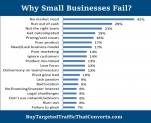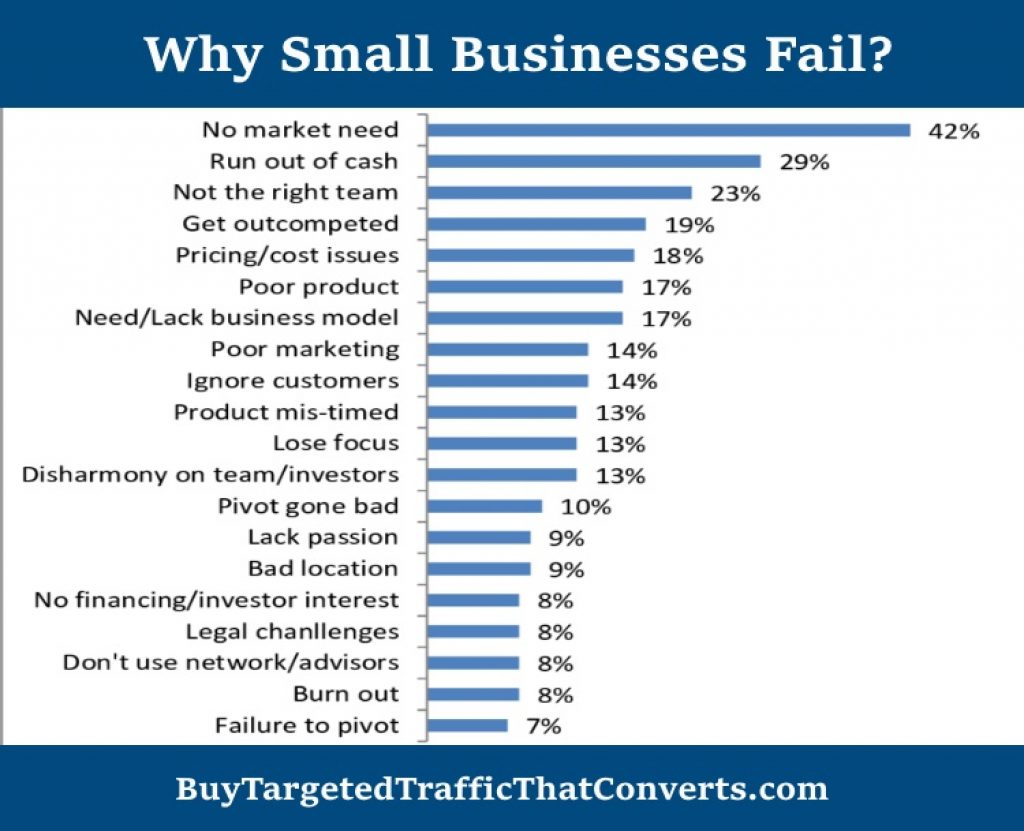
Why Some Startups Succeed (and Why Most Fail)? Ways to Avoid Failure..
Table of Contents
One thing for sure, a business almost always fails because of the entrepreneur.
“It’s not the plan that is important, it’s the planning.” Dr. Graeme Edwards
There are over 28 million small businesses in the United States, according to the SBA.
It’s an impressive number. The sad reality is that only about 50% of them survive. What’s worse is that only about one-third survive 10 years or more. The life of an entrepreneur is unforgiving. It is a constant challenge. There are many moving parts. Any one of them could put you out of business.
In the real world of brick and mortar business, every day millions of people are dragging themselves from their comfortable beds, performing their morning rituals of washing and breakfast to head to their jobs. In their daily grind some are thinking that there must be a better and easier way to make a living.
All these millions know someone or know of someone who has “made it” by quitting their boring existence and become their own boss using their own computers in the comfort and ease of home.
While the idea of working from home sounds like an ideal solution, most are just not preparing. Many of these unhappy people will just quit their jobs and jump right into the first internet marketing business they find with no preparation, no knowledge of what they are doing, no education, and no hope of success. Failure is their only option and they are not even aware of it.
According to many sources, more than 90% (Ninety percent) of all Internet business start-ups end in failure within the first 120 (one hundred twenty) days. And that number is all too accurate: NINETY PERCENT!
This alarming failure rate goes unheeded for a number of reasons:
1. Many don’t know the statistical probabilities they face.
2. Many don’t see themselves as being part of the failures or they wouldn’t leap.
3. Many are talked into things they are unprepared for.
4. Many don’t know the basic tenant of – “If you fail to plan, then you plan to fail.”
Of course, success is still a possibility. There IS that other 10% (ten percent) that do succeed. For them, success doesn’t happen by accident. And success isn’t just a crap shoot. Success happens because of some very important factors.
Success happens because people learn about internet marketing and how it works. They do not expect to get rich quick or be able to make a killing overnight and retire to a tropical isle.
It is strange but somehow the same people, who wouldn’t dream of starting a real world business, think they can make a go of an internet business even though they have no business background.
People think that an internet business just means that they no longer have to get up and go to work. They think they can simply work when the feel like it and still make a good living. They do not understand that any business requires them to work hard and sometimes work long hours.

Some Wrong Ideas on the Internet
That 90% failure rate of new Internet businesses really is not surprising when you think about the sort of people who start an internet business.
Most people seem to think that being a successful internet marketer is as easy as getting a website built and getting their own domain name and they could not be farther from reality.
Being a successful internet marketer requires self-discipline. People read books like “4 Hour Work Week” and think that partying all night, sleeping until noon and then 3 or 4 hours with a computer will make them rich.
There is not a magic button to push to have instant massive traffic to their million-dollar-like website and fistfuls of cash in their bank. It is just not going to happen.
Internet marketing does not run on auto-pilot. And while established internet marketing types do not put in the long, boring hours they have built their businesses by doing that in the past.
It does not happen overnight for anybody. Most people are not prepared for the time requirement necessary for an internet business to achieve success.
They Do Not Have a Business Background
All businesses whether large or small, Internet or “brick and mortar” have two things in common: they are a BUSINESS and must be operated like a business! Business people must understand accepted business practices.
There are simple and basic concepts like “acceptable over-head expenses in relation to projected income”. All entrepreneurs need to understand profit and loss and what constitutes each.
It is not a requirement to have a college degree in business to be successful but it wouldn’t hurt. On the other hand some basic business knowledge is an absolute necessity.
If it is difficult to balance your check book, then it might be a good idea to keep your day job and forget about being in business.
Yes, you can hire an accounting firm that will tell you WHEN to make tax deposits, but they will not tell you IF you need to make tax deposits.
An accountant can tell you if you made a profit but not how you make it. If you have no business background get some good business advice before you consider opening any business.
The fact is that all successful businesses follow the rules of sound business principles. A successful business is not an accident. The numbers tell the story that only 10% of all new internet businesses are successful or are even still in existence after their first 120 days.
Even the expectation of profit is not reasonable for the first few month.
Have sufficient resources available for everything from startup costs to personal needs for a period of time. It’s called “capital” and there is no alternative to plenty of it.
They Do Not Have The Right Mindset!
Most of us have heard the phrase, “He has an attitude!” And it is often a derogatory remark made about a person with a negative attitude.
The word “attitude” is important when thinking about marketing start-ups. A good attitude or a good mind set will not guarantee success but a bad attitude or a bad mind set can guarantee failure.
Let’s examine a few attitudes that will absolutely guarantee failure:
- I can work when I want to. This is absolutely wrong! You cannot just work when it suits you. Expect many long and sometimes boring hours of hard work for your business to succeed.
- I can get rich quick! This is a dangerous one. While getting rich quick is possible, there are too many “get rich quick” schemes that are only ways for the unscrupulous to take advantage of the willing. Expect to be wealthy in whatever time it takes. It is possible to make a very comfortable living in internet marketing but it is not usually quick or easy.
- I don’t need a business plan. Internet business is still a business. All business principles apply to online business as they do to brick and mortar business. It is imperative that you have a plan for your success based on sound business principles.
- Internet business people do not have a boss. You are the boss. A good boss sees that all work is completed on time and in full, or you will fail. Set up a work schedule and goals to meet or you will find yourself working at a job under a boss who does do those things and maybe for minimum wage.
Ways to Avoid Failure
Starting a business … any business … has no guarantee of success, period!
Even large multi-national businesses can fail in a new business venture. Failure is always an option and the possibility or probability of success can be enhanced.
You can increase your possibility of success by:
- Making a business plan BEFORE starting your online business. To remind you one of the things I said at the beginning: “If you fail to plan, then you plan to fail.” A plan for success is a requirement. Have the steps listed in great detail including reasonable cost estimates for completing each step.
- Expect to work hard to achieve your goals. Never expect things to be easy. Most of the time things are not as easy as they appear. Each successive step will require its own work, time and patience. Sometimes things don’t go right on the first try. Be willing to keep going again and again until you succeed.
- Do not fall for a get-rich-quick schemes. The internet woods are full of those who prey upon those who are looking for quick and easy ways to become rich. Most are ways for the other person to get rich quick from your money.
Why Some Startups Succeed (and Why Most Fail)?
- Market research: You’ve fulfilled your lifelong dream by starting a real estate agency. But the area you should be covering is already packed with realtors, and your service is surplus to the market’s needs. You fail.
- Business plan: Identifying market demand is just the beginning. You need to split your business plan into small, achievable goals, and predict potential problems and solutions.
- Funding: Whether you’re backed by a venture capitalist, an individual contributor, or the government, your business will probably need repeat investments. The best startup advice you can get is to not stretch for cash during your first year, or you might never get off the ground.
- Location and marketing: An integrated, multi-channel online presence is a must for any business to survive in the 21st century. If you open a coffee shop with no website or social media presence in a neighborhood that couldn’t care less, you’re going to have a bad time.
- Knowledge: The truth is that some entrepreneurs take up this challenge with little to no previous knowledge of finance, accounting, or their niche. Make sure you enroll in courses to learn the skills you need before you try to break into the market.
Businesses fail for many reasons. The following list includes some of the most common reasons:
1 – Lack of planning – Businesses fail because of the lack of short-term and long-term planning. Your plan should include where your business will be in the next few months to the next few years. Include measurable goals and results. The right plan will include specific to-do lists with dates and deadlines. Failure to plan will damage your business.
2 – Leadership failure – Businesses fail because of poor leadership. The leadership must be able to make the right decisions most of the time. From financial management to employee management, leadership failures will trickle down to every aspect of your business. The most successful entrepreneurs learn, study, and reach out to mentors to improve their leadership skills.
3 – No differentiation – It is not enough to have a great product. You also have to develop a unique value proposition, without you will get lost among the competition. What sets your business apart from the competition? What makes your business unique? It is important that you understand what your competitors do better than you. If fail to differentiate, you will fail to build a brand.
4 – Ignoring customer needs – Every business will tell you that the customer is #1, but only a small percentage acts that way. Businesses that fail lose touch with their customers. Keep an eye on the trending values of your customers. Find out if they still love your products. Do they want new features? What are they saying? Are you listening? I once talked to the CEO of a training company who told me that they don’t respond to negative reviews because they are unimportant. What? Are you kidding me?
5 – Inability to learn from failure – We all know that failure is usually bad, yet it is rare that businesses learn from failure. Realistically, businesses that fail, fail for multiple reasons. Often entrepreneurs are oblivious about their mistakes. Learning from failures is difficult.
6 – Poor management – Examples of poor management are an inability to listen, micro-managing – AKA lack of trust, working without standard or systems, poor communication, and lack of feedback.
7 – Lack of capital – It can lead to the inability to attract investors. Lack of capital is an alarming sign. It shows that a business might not be able to pay its bills, loan, and other financial commitments. Lack of capital makes it difficult to grow the business and it may jeopardize day-to-day operations.
8 – Premature scaling – Scaling is a good thing if it is done at the right time. To put it simply, if you scale your business prematurely, you will destroy it. For example, you could be hiring too many people too quickly, or spend too much on marketing. Don’t scale your business unless you are ready. Pets.com failed because it tried to grow too fast. They opened nationwide warehouses too soon, and it broke them. Even the great brand equity that they have built couldn’t save them. Within a few months, their stock went from $11 to $0.19.
9 – Poor location – Poor location is a disadvantage that might be too much to overcome. If your business relies on foot traffic, location is a strategic necessity. A poor location might make your customer acquisition costs too high.
10 – Lack of profit – Revenue is not the same as profit. As an entrepreneur, you must keep your eyes on profitability at all times. Profit allows for growth. According to Small Business Trends, only 40% of small businesses are profitable, 30% break even, and 30% are losing money.
11 – Inadequate inventory management – Too little inventory will hurt your sales. Too much inventory will hurt your profitability.
12 – Poor financial management – Use a professional accounting software like Freshbooks. Keep records of all financial records and always make decisions based on the information you get from real data. Know where you stand all the time. If numbers are not your thing, hire a financial professional to explain and train you to understand, at least the basics.
13 – Lack of focus – Without focus, your business will lose it the competitive edge. It is impossible to have a broad strategy on a startup budget. What makes startups succeed is their ability to quickly pivot, and the lack of focus leads to the inability to make the necessary adjustments.
14 – Personal use of business funds – Your business is not your personal bank account.
15 – Overexpansion – It is easy to make the mistake of expanding your business into too many verticals. Before you enter new markets make sure you maximize your existing market.
16 – Macroeconomic factors – Entrepreneurs can’t control macroeconomic factors. Common macroeconomic factors are business cycles, recessions, wars, natural disasters, government debt, inflation, and business cycles. Your business can still succeed in bad times. Hyatt, Burger King, FedEx, Microsoft, CNN, MTV, Trader Joe’s, GE, HP are only a few examples of wildly successful companies started during a tough economy.
17 – No succession plan – Future leaders should be identified in advance. Without an effective succession plan, your business is unprepared to fill openings in created by retirements, unexpected departures, or death.
18 – Wrong partner – It’s no secret that it is easier to succeed in business with the right partners. The wrong business partner will, at the very least hurt, or, at worst, destroy your company.
If you are serious about making it as entrepreneurs, focus on the following:
19 – Make a plan – It all begins with planning. The biggest mistake many entrepreneurs make as they start their ventures is that they don’t sit down and write a business plan. The goal is to keep it concise. Don’t treat it like a business school project. Leave writing a 50,000-word business plan to academics. Let them waste their time. You can do a great business plan in one or two pages. There are some great books on business plans such as “The Secrets to Writing a Successful Business Plan” and “Successful Business Plan“.
FAQ
What percentage of new businesses fail in the first year?
It’s estimated that around 20% of businesses don’t live past their first year. This is a minority, of course, but still a significant risk to be aware of. Bad online and offline marketing, as well as poor market research, are probably the chief culprits here. Remember to over-prepare and conduct in-depth research before you decide to start building your business.
What percentage of entrepreneurs are successful?
If you’re optimistic, the one standard that seems to apply across all cultures and societies is the 10-year milestone. Only 30% of businesses live to see their 10th birthday, so entrepreneurs can consider themselves successful if they make it into their 11th year. According to a 2018 report, over 67% of the adult population hold entrepreneurs in high esteem. Enjoying that respect within their community helps them be happier and makes them more likely to succeed. (Exploring the Factors of Startup Success and Growth) (Fundera)
What percentage of startups are successful?
About 80% of startups that have employees will keep working after their first-year milestone. The Bureau of Labor Statistics provided the most recent research on this issue, which shows that 79.9% of businesses that opened in March 2016 were still operating in March 2017. (BLS.gov)
Remember those statistics! Ninety percent of all new internet businesses fail in the first 120 days. You don’t have to be part of that majority. You can become a part of that 10% minority of successful internet business enterprises. Find something that others are having success with – to the level you want your own success, do what they do, and you will have your own success. Be prepared to do whatever it takes for as long as it takes.
Don’t be fooled: the myth of the personality cult, maverick tech entrepreneur who makes millions winging it is a sham. If you’re born into considerable wealth, you might be able to pull that off. The chances are, though, that you’ll only succeed if you work harder and smarter than your competition. Over-prepare, read up on all the you can get your hands on, then prepare yourself for the ultimate leap of faith so you don’t become just another number in the startup failure rate.
Yes, it is true that most businesses fail. It is also true that many of them succeed. Those that succeed are not the result of miracles. Entrepreneurs who lead businesses to success understand that it takes a carefully planned and executed strategy. A little luck also helps.















FREE ChatGPT